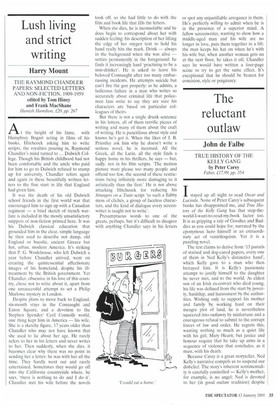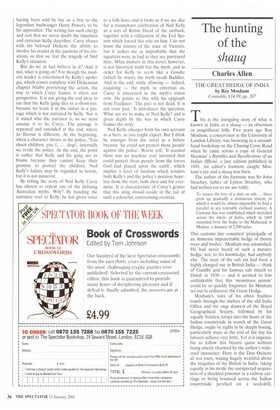The reluctant outlaw
John de Falbe
TRUE HISTORY OF THE KELLY GANG by Peter Carey Faber, £17.99, pp. 354 Istayed up all night to read Oscar and Lucinda. None of Peter Carey's subsequent books has disappointed me, and True History of the Kelly Gang has that stop-theworld-I-want-to-read-my-book factor too. It is as gripping a tale of Goodies and Baddies as you could hope for, narrated by the eponymous hero himself in an extraordinary act of ventriloquism. Yet it is a puzzling novel.
The text claims to derive from '13 parcels of stained and dog-cared papers, every one of them in Ned Kelly's distinctive hand', which Kelly gave to a man who then betrayed him. It is Kelly's passionate attempt to justify himself to the daughter he never met, and to the world. As eldest son of an Irish ex-convict who died young, his life was defined from the start by poverty, hardship, and harassment by the authorities. Wishing only to support his mother and family by working hard On their meagre plot of land, he is nevertheless squeezed into outlawry by misfortune and a courageous refusal to submit to the corrupt forces of law and order. He regrets this, wanting nothing so much as a quiet life with his girl. Mary Hearn; but justice and honour require that he take up arms in a sequence of violence that concludes, as it must, with his death.
Because Carey is a great storyteller, Ned Kelly's narrative compels us to suspend our disbelief. The story's inherent sentimentality is carefully controlled — Kelly's mother, for example, is no angel: Ned is devoted to her (in good outlaw tradition) despite having been sold by her as a boy to the legendary bushranger Harry Powers, to be his apprentice. The writing has such energy and zest that we never doubt the injustices and cynicism Kelly describes. Carey shares with his beloved Dickens the ability to involve his reader in the passions of his creations, so that we feel the tragedy of Ned Kelly's situation.
But do we in fact believe in it? And if not, what is going on? For though the modern reader is entertained by Kelly's apologia, which comes complete with Dickensian chapter blurbs previewing the action, the way in which Carey frames it alters our perspective. It is not giving the end away to say that the Kelly gang dies in a shoot-out, because we learn it at the outset in a pas-. sage which is not narrated by Kelly. Nor is it stated who the narrator is, so we must assume it to be Carey. The passage is repeated and extended at the end, where its flavour is different. At the beginning, when a character shouts at the police, 'You
shoot children, you f dogs', internally we revile the police. At the end, the point is rather that Kelly and his gang are to blame because they cannot keep their promise to protect the children. Ned Kelly's failure may be regarded as heroic, but it is not innocent.
By telling the story of Ned Kelly Carey has chosen to repeat one of the defining Australian myths. Why? By handing the narrative over to Kelly, he has given voice to a folk hero, and it looks as if we are due for a triumphant celebration of Ned Kelly as a sort of Robin Hood of the outback, together with a vilification of the Evil System which forced this role on him. I do not know the history of the state of Victoria, but it strikes me as improbable that the squatters were as bad as they are portrayed here. What matters in this novel, however, is not historical truth but the myth, and in order for Kelly to seem like a Goodie (which he must), the myth needs Baddies. And in the end, while allowing — indeed, requiring — the myth to entertain us, Carey is interested in the myth's status now. He points to this with his epigraph from Faulkner: 'The past is not dead. It is not even past.' It introduces the question, What are we to make of Ned Kelly? and is given depth by the way in which Carey frames the story.
Ned Kelly emerges from his own account as a hero, as you might expect. But I think he emerges from the novel as a failure because 'he could not protect these people against the police'. Worse still, 'It seemed there was no machine ever invented that could protect these people from the forces God had placed upon the earth', which implies a level of fatalism which renders both Kelly's and the police's position hopeless from the start, both then and for evermore. It is characteristic of Carey's genius that this sting should reside in the tail of such a colourful, entertaining creature.































































 Previous page
Previous page